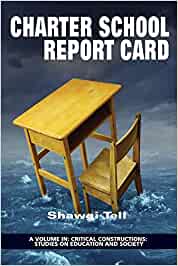 Even though they receive enormous sums of public money and are ostensibly “public” schools “open to all,” charter schools have a long track record of discriminatory enrollment practices. Selective enrollment practices are widespread in non-profit and for-profit charter schools. Few charter schools have a truly diverse student body.
Even though they receive enormous sums of public money and are ostensibly “public” schools “open to all,” charter schools have a long track record of discriminatory enrollment practices. Selective enrollment practices are widespread in non-profit and for-profit charter schools. Few charter schools have a truly diverse student body.
In recent years more research has shown how charter schools intensify segregation (see here, here, and here.)
While public schools accept all students at all times, charter school owners and operators use many covert and overt strategies to cherry-pick students A main reason for such cherry-picking is to enroll mostly those students who will perform well on educationally unsound high-stakes standardized tests produced by large for-profit corporations. Charter school owners and operators are incentivized to do this in order to keep their contract (charter). Poor academic performance is one of the main reasons a charter school’s contract can be revoked. Thus, it is not unusual to frequently see non-profit and for-profit charter schools, all of which are run by unelected individuals, enroll disproportionately fewer English Language Learners, students with special needs, and homeless students. They also tend to avoid or “push out” students with “behavior problems.”
New Mexico recently made the news when the Santa Fe New Mexican reported on August 21, 2021 that “some” charter schools in that state may be using school admission policies that may be discriminatory. Specifically, some charter schools in the state “are violating state rules by requesting information about prospective students’ special-education needs.” The news report was based on an investigation conducted by a private law firm called Pegasus Legal Services. The newspaper goes on to say that:
Research has shown students who require special-education services often are discouraged from enrolling in charter schools. In 2018, Columbia University conducted a study on the issue. Researchers posing as parents sent out more than 6,000 emails to schools in 29 states, including New Mexico. They found schools were significantly less likely to respond to emails signaling the student had a disability.
It is well-known that charter schools not only under-enroll students with special needs, but when they do enroll students with special needs it is usually special needs students with mild disabilities, not severe disabilities. And even in this context, charter schools often play various shell games and student re-classification games to dodge various requirements. All of this has to do with avoiding high-need/high-cost students because both non-profit and for-profit charter schools operate as exchange-values, not use-values. In other words, charter schools avoid high-need/high-cost students because they are driven mainly by financial gain. By contrast, this is not how the nation’s 100,000 public schools operate.
Some charter school operators in New Mexico feigned ignorance when the Santa Fe New Mexican news report was published and pledged to “fix things.” Other charter school operators arrogantly and defiantly turned the issue around and made it sound like “being rigorous” is why they do not enroll many students with special needs. For their part, various state officials made it sound like they are perturbed by selective enrollment practices and created the impression that they would investigate such “disturbing” practices, which is unlikely to happen. Either way, long-standing discriminatory enrollment practices in schools that are funded by public dollars and said to be “public” and “open to all” violate a basic sense of justice and principles when they are not truly equitable and open to all. The charter school sector has been dogged by many other antisocial trends for 30 years.
The problem of the lack of diversity in privately-operated charter schools once again raises the issue of why there is such poor oversight and accountability in the crisis-prone charter school sector. Charter schools appear to be immune to pro-social reforms and are stubbornly neoliberal in their orientation and operations.
New Mexico passed its charter school law in 1993. Currently, there are nearly 100 charter schools in the state. Charter school laws exist in 45 states, Washington DC, Puerto Rico, and Guam. At 1,300, California has the most charter schools in the nation. Texas, Florida, Arizona, Michigan, Washington DC, and New Orleans are also heavily saturated with charter schools run by unelected officials. Currently, about 3.4 million students are enrolled in roughly 7,400 deregulated charter schools across the country. Most of these students are poor or low-income minority urban youth. It is also worth noting that more than 3,000 charter schools have closed over the past 30 years, usually for three main reasons: financial malfeasance, mismanagement, or poor academic performance.










